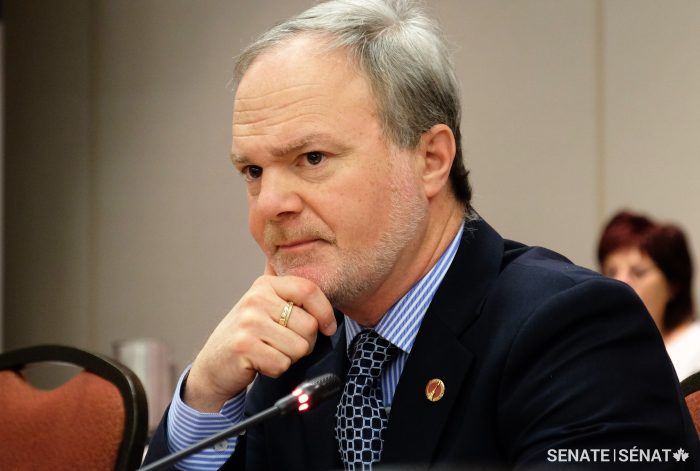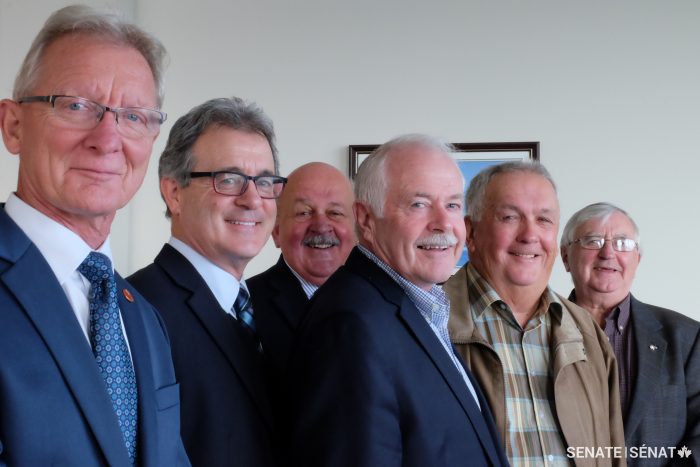Studying pipelines in Eastern Canada

While Canada has the third-largest oil reserves in the world, many Canadians fill their tanks with gas from abroad — Canada does not have the infrastructure in place to get Western oil to other parts of the country. Canada remains dependent on foreign oil and existing infrastructure is only connected to the United States, which pays much lower prices than countries elsewhere in the world.
After studying these issues in Western Canada, members of the Senate Committee on Transport and Communications went on a fact-finding mission in Quebec and in the Maritimes to continue working towards proposing a responsible strategy to facilitate the transport of crude oil in Canada.
Quebec
 In Montreal, senators met with leaders of the business world and answered questions about employment and social acceptability.
In Montreal, senators met with leaders of the business world and answered questions about employment and social acceptability.
Quebec is different than Western Canada and Quebecers are less familiar with the hydrocarbon industry, Yves-Thomas Dorval, President of the Conseil du patronat du Québec, told the committee.
“There are jobs involved here. There are jobs for Montrealers, there are jobs for Quebecers," said Senator Terry Mercer.
 Michel Leblanc, President of the Chamber of Commerce of Metropolitan Montreal, is in favour of an eastern oil pipeline. He spoke of the importance of maintaining strong relationships with communities along its route. Leblanc also said that part of any profits should be used to fund the transition to green energy.
Michel Leblanc, President of the Chamber of Commerce of Metropolitan Montreal, is in favour of an eastern oil pipeline. He spoke of the importance of maintaining strong relationships with communities along its route. Leblanc also said that part of any profits should be used to fund the transition to green energy.
New Brunswick
The conversation on social acceptability and employment continued in Saint John, NB, where senators met with political, indigenous and business leaders, and environmentalists.
“We can see in the other provinces to what extent the development of petroleum resources has transformed their economy,” said Bill Breckenridge, Assistant Deputy Minister, department of Energy and Resource Development in New Brunswick.
 He added a lack of energy literacy among a large part of the population creates concerns about energy projects that are not always well-founded.
He added a lack of energy literacy among a large part of the population creates concerns about energy projects that are not always well-founded.
Senator Pierre-Hugues Boisvenu noted opponents of the project have done a better job of persuading people.
Environmentalists from Ecology Action Centre expressed their concerns about risks to the Bay of Fundy, and jobs in the fishing and tourism industries.
Nova Scotia
The committee’s investigation continued in Point Tupper, Nova Scotia, which many argue should be the boundary of an eastern oil pipeline, especially as it would reduce risks to the Bay of Fundy.
“When you export through the East Coast of Canada you have to go through (Nova Scotia’s) waters, there’s no getting around that, whether it’s the Bay of Fundy, the Strait of Canso or the Cabot Strait,” said Senator MacDonald.
 “There's a very strong argument to be made that it should be going out through the Strait of Canso because it’s the deepest port, it’s on the open ocean, it doesn’t have the tide and environmental issues that the Bay of Fundy has,” Senator MacDonald continued.
“There's a very strong argument to be made that it should be going out through the Strait of Canso because it’s the deepest port, it’s on the open ocean, it doesn’t have the tide and environmental issues that the Bay of Fundy has,” Senator MacDonald continued.
Nova Scotia’s Minister of Energy, Michel Samson, seemed receptive to this option and the leader of the official opposition of the province, Jamie Baillie, vigorously argued for the extension of the oil pipeline to Point Tupper.
The committee is expected to submit its final report in March 2017.
Related articles
Tags
Committee news
Studying pipelines in Eastern Canada

While Canada has the third-largest oil reserves in the world, many Canadians fill their tanks with gas from abroad — Canada does not have the infrastructure in place to get Western oil to other parts of the country. Canada remains dependent on foreign oil and existing infrastructure is only connected to the United States, which pays much lower prices than countries elsewhere in the world.
After studying these issues in Western Canada, members of the Senate Committee on Transport and Communications went on a fact-finding mission in Quebec and in the Maritimes to continue working towards proposing a responsible strategy to facilitate the transport of crude oil in Canada.
Quebec
 In Montreal, senators met with leaders of the business world and answered questions about employment and social acceptability.
In Montreal, senators met with leaders of the business world and answered questions about employment and social acceptability.
Quebec is different than Western Canada and Quebecers are less familiar with the hydrocarbon industry, Yves-Thomas Dorval, President of the Conseil du patronat du Québec, told the committee.
“There are jobs involved here. There are jobs for Montrealers, there are jobs for Quebecers," said Senator Terry Mercer.
 Michel Leblanc, President of the Chamber of Commerce of Metropolitan Montreal, is in favour of an eastern oil pipeline. He spoke of the importance of maintaining strong relationships with communities along its route. Leblanc also said that part of any profits should be used to fund the transition to green energy.
Michel Leblanc, President of the Chamber of Commerce of Metropolitan Montreal, is in favour of an eastern oil pipeline. He spoke of the importance of maintaining strong relationships with communities along its route. Leblanc also said that part of any profits should be used to fund the transition to green energy.
New Brunswick
The conversation on social acceptability and employment continued in Saint John, NB, where senators met with political, indigenous and business leaders, and environmentalists.
“We can see in the other provinces to what extent the development of petroleum resources has transformed their economy,” said Bill Breckenridge, Assistant Deputy Minister, department of Energy and Resource Development in New Brunswick.
 He added a lack of energy literacy among a large part of the population creates concerns about energy projects that are not always well-founded.
He added a lack of energy literacy among a large part of the population creates concerns about energy projects that are not always well-founded.
Senator Pierre-Hugues Boisvenu noted opponents of the project have done a better job of persuading people.
Environmentalists from Ecology Action Centre expressed their concerns about risks to the Bay of Fundy, and jobs in the fishing and tourism industries.
Nova Scotia
The committee’s investigation continued in Point Tupper, Nova Scotia, which many argue should be the boundary of an eastern oil pipeline, especially as it would reduce risks to the Bay of Fundy.
“When you export through the East Coast of Canada you have to go through (Nova Scotia’s) waters, there’s no getting around that, whether it’s the Bay of Fundy, the Strait of Canso or the Cabot Strait,” said Senator MacDonald.
 “There's a very strong argument to be made that it should be going out through the Strait of Canso because it’s the deepest port, it’s on the open ocean, it doesn’t have the tide and environmental issues that the Bay of Fundy has,” Senator MacDonald continued.
“There's a very strong argument to be made that it should be going out through the Strait of Canso because it’s the deepest port, it’s on the open ocean, it doesn’t have the tide and environmental issues that the Bay of Fundy has,” Senator MacDonald continued.
Nova Scotia’s Minister of Energy, Michel Samson, seemed receptive to this option and the leader of the official opposition of the province, Jamie Baillie, vigorously argued for the extension of the oil pipeline to Point Tupper.
The committee is expected to submit its final report in March 2017.


